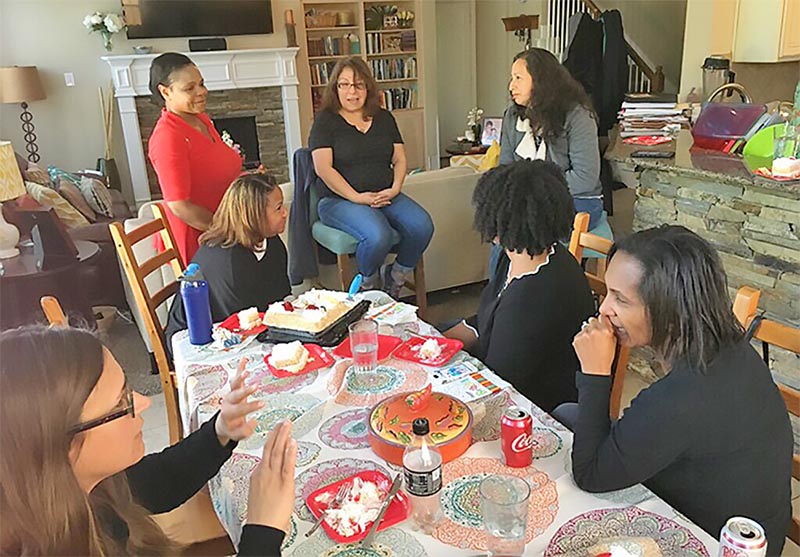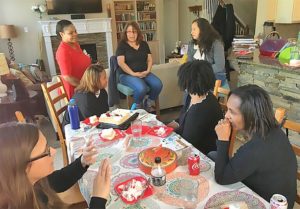



Participants in a dynamic Zoom prayer gathering in Rockwall, Texas, say that together, they have gained insights on reshaping the spiritual culture of their community, the nature of friendships, the significance of learning about racism, and the impact unity can have on their neighborhood.
“We feel like we’re spiritual sisters,” says Kenyatta Sterling, “and even though we’re from different faiths we see God working in each of our lives and bringing us together.”
Since August 2020, Sterling, a Christian, has participated in the weekly devotional gathering aimed at advancing the discourse on racial justice hosted by Naomi de la Torre and her husband, Danny, from the Rockwall Baha’i community. Each week the group says prayers and presents topics around the theme of race. Naomi de la Torre says each participant takes turns hosting. Their discussions inspire the next week’s presenter and theme.
Sterling says she appreciates the welcoming environment de la Torre created from the beginning, with people introducing themselves and saying what they were hoping to gain from the space before they pray together.
De la Torre says, “Having dialogue about racism in our country is uncomfortable. And it’s OK if the conversation gets uncomfortable. It’s really difficult to face these hard truths about our society.”
“I think that people are so shielded from some of the true history of our country,” de la Torre points out. “While talking about it, some participants prefer to move on to the ‘healing part.’ How to move forward is not an easy conversation to have even when you approach it from a spiritual perspective. It can be challenging.”
Sterling says,“When you have conversations about race it requires a certain amount of courage and a certain amount of transparency, and when you’re coming into a group where you don’t know people it’s kind of hard to trust others with something that is so sensitive and so personal.
“As an African American woman from the South, the conversations that I have with her [Naomi] as a white woman I have never had before, and so we were excited about the possibility of breaking into some new territory,” says Sterling.
“Just knowing each other’s story and narratives maybe would help remove some of the misinformation, the stereotypes, the anger, the fear, whatever is hindering the unity,” she says.
“When you humanize an issue, when it’s not just something that’s being told to you through the media, when it’s a real person in front of you, it makes a much bigger impact.
“I know that there are people in the group that felt racism was over-hyped, that it was a crutch, that it was an exaggeration, and as they heard stories that were being shared, tears were being shared as you’re explaining that this is my life, this is what happened to my child, this is what happened to my brother or my father,” Sterling says.
“You can talk about history and facts all day long but until people see how it impacts human lives, I think that is the benefit of these groups because you are literally hearing the story of the person sitting across from you,” Sterling explains.

About the gathering, Sterling recalls, “I remember being excited by the fact it was such a diverse group from race, to faith, to age, to experiences, to where we’ve lived, and our education levels. We also have a participant who is an atheist and what he has brought to the group has been something that we needed.”
Sterling says that if a group is not diverse and a person feels like they are the representative of their race, that’s difficult. She says she was able to see prejudice experienced by other people based not just on race, but also on religion or gender inequality. Coming together in prayer “gives you that chance to have that empathy, and that sympathy, and that understanding.”
After several weeks they decided to also begin a study of the Baha’i writings together. “As we continued to go through different discussions about things that were going on in the world, Naomi and I began to talk about how most of this [learning and understanding] comes down to the spiritual aspect of unity and humanity,” Sterling says.
“It was just kind of an awakening of ‘We’re all in this together.’ We may be in different places in our understanding but there is room for growth and improvement for everybody. That was something that took away my fear and hesitation. We’re sitting across from each other at the table because we all want something better,” Sterling says.
When inviting people, “I told Naomi, use your spiritual eye, let God show you who needs to be a part of this group. And so it just grew from there, and as people got excited about it they would invite someone in and a new person would come in, maybe just for a few weeks, but what they brought for those two weeks was something that our group needed and so it’s [the devotional] got these kind of moving and expanding parts. We actually have a couple of people that are starting their own group and so that’s exciting, too, because then you see when something catches fire, it lights what’s next to it.”
“What I’ve learned is that love can look many different ways,” Sterling adds. “Maybe not necessarily in the way that you expect it. I think God has brought this diverse group of people into my life to show me love in different ways and to reflect love in different ways, and so I think it has expanded my definition of what love is and what it looks like. It shows me the power of love transcending everything,” she says.
“It has expanded my faith, it’s expanded my idea of God, it has expanded my idea of who’s my brother, and my sister, who’s my neighbor…when you really get to the heart of it, if you love God then you have to love the people that have been created by God.”
All of these neighbors are committed to contributing to advancing humanity toward a racially just world. “What I’ve learned is that Bahá’u’lláh’s revelation is accessible and open to everyone and He’s drawn this circle of unity and it’s the whole world. So really it’s our job to figure out how to have conversations so that we can get better at helping people to recognize Bahá’u’lláh and grow closer to him so that we can all feel the transformative effect of this revelation on our communities.” shares de la Torre.
Hazelina Johnson was a participant in the regular women’s devotional meeting in Rockwall, Texas, when the pandemic hit.
Johnson says that the gatherings, which have since moved online, bring together women of varied faiths and cultures to share their thoughts, prayers and poems. “The basis was to support each other, learning to understand what God’s purpose was for us women, and how to help our family and our communities as we strengthen ourselves,” she says. “At one point there were 15 of us. It was a really powerful experience.”
“Topics ranged from motherhood to diversity, to marriage or whatever it was that God placed on that person’s heart,” says Johnson. Conversations turned to health and racial justice as the women were increasingly dealing with these issues.
Inspired by these gatherings, Johnson has taken her own initiative to foster the spiritual dynamic and culture of her community with what she calls “Walk Well Visits.”
She goes to different women’s homes in the neighborhood and visits with them on the curb and talks and prays with them.
“I am a runner and I run with my friends, so instead of just going on a five-mile run with others I thought, ‘why don’t I just put these ladies on my route so I get to see how they’re doing?’”
“I’d walk a mile and half to one friend’s house, laugh with her, talk with her, have her get some sunshine, breathe some air and pray with her. Then, I’d walk from her house to another friend’s house, then to another friend’s house which is another mile or two away,” she says.
“Then sometimes I would bring the women with me. It meant so much to them, and some of them would cry because they just hadn’t gotten out of the house,” Johnson says. “It ended up being a blessing to them and one for myself as well.”


![]()
![]()
Whether you are exploring the Bahá'í Faith or looking to become an active member, there are various ways you can connect with our community.
Please ensure that all the Required Fields* are completed before submitting.